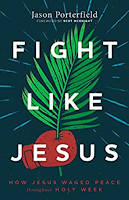Holy Week 2021: Tuesday
Mark 11:20-13:37 /////////// Shema
There is a lot in the texts for today as we continue our journey with Jesus to the cross. Jesus has entered Jerusalem, the central hub of Jewish culture and worship on Sunday. Yesterday, we looked at Jesus cursing the fig tree and cleansing the temple, which I'm sure angered a lot of people. In today's reading, we have several instances of the religious leaders pushing back against Jesus's authority. Several different groups of leaders come to him several times and question him, trying to trap him in his words. They ask him about the authority that he acts under, they ask him about paying taxes, they ask him about resurrection, and they ask him about the Law of Moses. Jesus doesn't sugarcoat things- he tells a parable that explains how terrible the "chief priests, the teachers of the law, and the elders" have been. In 12:38-40, Jesus outwardly speaks against the religious leaders in the city. Finally, in chapter 13, Jesus begins to teach about the end times.For me, the focus of this section of scripture comes in the final test that the teachers of the law brought before Jesus. They come to him and ask him an impossible question: "Of all the commandments, which is the most important?" (12:28). This is a difficult question because the teachers of the law stressed the importance of following all of the law, not just parts of it. So, Jesus, out of the 613 laws of Moses, which one is most important for us to obey?
This past year has been really difficult for a lot of people. It has been approximately a year before our vocabulary was expanded to include words and phrases like "quarantine," "global pandemic," "non-essential," "mask mandate," and "national state of emergency." Suddenly, everything shut down as we were asked to "slow the spread" by staying home. As a result, churches shut down, businesses closed the doors, and people sheltered in place for a while. I believe that the effects of the virus have yet to become fully realized. Many of us have lost loved ones to the CoViD-19 pandemic. Some have still not ventured out much, and we still have to wear masks everywhere we go for the foreseeable future.
Out of this monumental and unprecedented year, there were a lot of talks about what is essential and what is not. We learned that toilet paper is the most essential thing for most people! I still remember that first time we went to the grocery store after the pandemic started, seeing the empty aisles where toilet paper, paper towels, hand sanitizer, and cleaning supplies used to find their homes. I heard one pastor joke about the essential nature of toilet paper revealed, calling shopping at the store a "game of thrones." Forget oil, forget gold, forget money, we need TP!
There has been a lot of discussion across the country about what is most important for us. The church is no exception. For the church, we have also been challenged with examining our priorities. When the church can't have church on Sundays, what do we do? In many ways, this has been a really healthy question. There has been an increasing influence on church identity, realizing that church is a people and not a place to go once a week. We have had some tough discussions, including a recognition that maybe we have been doing this all wrong all along. Remember yesterday's devotional? CoViD-19 has provided the church with a giant reset button. However, we still must answer the questions: what is most important for us today? Can we go back to the way things were pre-CoViD? What is essential for the church?
It is in this way that I think the words of Jesus echo for us today. Jesus tells us what is most essential: "'The most important one,' answered Jesus, 'is this: "Hear O Israel: The Lord our God, the Lord is one. Love the Lord your God with all your heart and with all your soul and with all your mind and with all your strength." The second is this: "Love your neighbor as yourself." There is no greater commandment greater than these.'"


Comments
Post a Comment